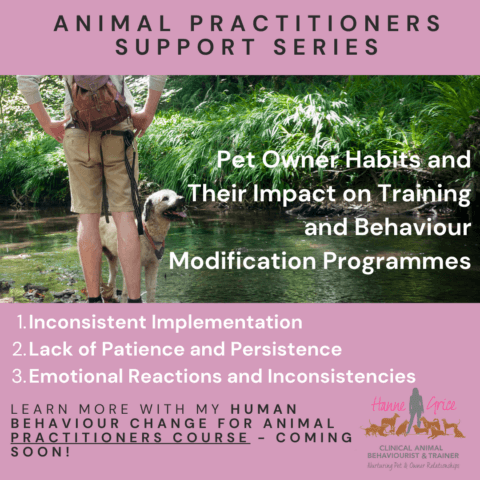This article is aimed at animal practitioners to help them better understand their clients, where habits may impact the success of the training/behavioural plan, and how they can help their clients overcome this.
Pet owner habits play a crucial role in the success of training and behaviour modification programmes for their beloved furry companions. Certain habits can either support or hinder progress, influencing the effectiveness of the programme. This article explores the reasons behind the development of habits that may impact the success of such programs and offers strategies to overcome these challenges. By understanding and addressing these habits, professionals can enhance their clients’ ability to achieve positive outcomes in training and behaviour modification.

- Inconsistent Implementation: One common habit that can hinder the success of training programs is inconsistent implementation. Pet owners may struggle to maintain a consistent routine, failing to reinforce desired behaviours consistently or inadvertently rewarding unwanted behaviours. Inconsistency can lead to confusion for the pet and impede progress.
- Lack of Patience and Persistence: Another habit that can impact success is a lack of patience and persistence. Training and behaviour modification require time, effort, and consistent application. Pet owners may become discouraged or give up too quickly if they do not see immediate results. This habit can undermine progress and hinder the development of desired behaviours.
- Emotional Reactions and Inconsistencies: Emotional reactions and inconsistencies in pet owner behaviour can also affect the success of training programs. For example, reacting with frustration or anger to undesired behaviours can create confusion and anxiety in pets. Additionally, inconsistency in setting and enforcing boundaries can lead to mixed messages, making it challenging for pets to understand expectations.
Overcoming Challenges
To overcome these habits and enhance the success of training and behaviour modification programmes, professionals can employ the following strategies:
- Education and Clear Communication: Providing thorough education and clear communication about the importance of consistent implementation and the expected time frame for behavior change is essential. Explaining the benefits of patience, persistence, and maintaining emotional consistency can help pet owners understand the significance of their habits.
- Setting Realistic Expectations: Setting realistic expectations is crucial to manage pet owners’ anticipation of immediate results. Professionals should emphasise that behaviour change takes time and effort, encouraging pet owners to remain committed and patient throughout the process.
- Consistent Reinforcement and Positive Feedback: Encouraging pet owners to consistently reinforce desired behaviours and provide positive feedback is vital. Professionals can guide owners in developing rewarding techniques, such as using treats, praise, and play, to reinforce desired behaviours. Consistent positive reinforcement strengthens the bond between owners and pets, facilitating the learning process.
- Ongoing Support and Accountability: Offering ongoing support and accountability can help pet owners stay motivated and committed. Regular check-ins, progress assessments, and providing additional resources or guidance when needed can help address challenges and reinforce positive habits.
Understanding the impact of pet owner habits on training and behavior modification programs is essential for professionals in the field. By recognising and addressing inconsistent implementation, lack of patience and persistence, and emotional reactions and inconsistencies, professionals can support pet owners in developing positive habits that contribute to the success of the programmes. By implementing strategies such as education, setting realistic expectations, consistent reinforcement, and ongoing support, professionals can help pet owners overcome challenges and achieve positive outcomes for their beloved animal companions.
Want to learn more? Check out my Learning Hub which includes courses aimed at animal professionals to develop their knowledge and understanding about human-animal interactions and improve the client-animal practitioner relationship, to increase the success of behaviour/training modification programmes and client cooperation.
References:
- Hiby, E. F., Rooney, N. J., & Bradshaw, J. W. (2004). Dog training methods: Their use, effectiveness and interaction with behavior and welfare. Animal Welfare, 13(1), 63-69.
- Miller, P. E., & Howell, T. J. (2017). The effects of training and environmental enrichment on behavior and cognition in dogs. Journal of Veterinary Behavior, 19, 17-24.
- Overall, K. L. (2013). Manual of clinical behavioral medicine for
Learn more about our classes

Get Hanne's book, clothing and more
Hanne has a number of publications including her book Playing With Your Dog to help owners work out the games that are best suited for their pet to play throughout his life, from puppyhood to old age, available from Amazon. Check out Hanne's range of contemporary casuals The Collection – for pet lovers made from recyclable, organic materials that are sustainably sourced.

